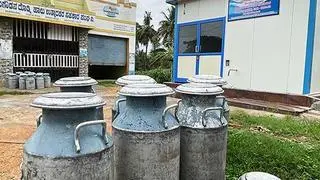Huballi-based Deshpande Startups, one the country’s largest technology business incubators, has developed a dehydration machine to convert agricultural produce such as bananas and ginger to chunks or powder.
Arvind Chinchure, the company’s chief executive officer (CEO), told businessline that the machine is provided to women self-help groups (SHGs), comprising 5-6 women. The SHG then secures bananas, ginger or jackfruits locally and converts them.
More innovation on cards
The machine improves the shelf-life of agricultural produce to a year and more. “We have developed our own dehydration machine because we want our women SHGs to be able to afford this. We will be doing a lot of innovation in the value chain,” he said during an online interaction.
Deshpande Startups began a pilot project with two women SHGs in Sirsi taluk of Karnataka’s Uttara Kannada district. “We are doing the next pilot with 5 more machines through another 5 SHGs. Our goal is to touch 50 SHGs in a year and 100 in a year-and-half,” he said.
The incubator, launched six years ago, has a $1 million donor for the pilot project to ensure every product has a market. Deshpande Startups take care of the marketing of the dehydrated produce manufactured by the SHGs.
Ginger next
The two dehydrated machines are currently producing one tonne of banana power and chunks against a local demand of 20 tonnes. “That’s why we have ordered another 5 machines. Over the next six months, we will have all the 10 installed and running,” he said.
Currently, the dehydration machine is being used for bananas as “we did not want anything of the banana to go to waste,” Chinchure said.
The company has also done dehydration of ginger and when the season changes, the spice crop will be taken up.
The objective behind the launch of the dehydration machine is that while top-quality produce gets picked for sale immediately, inferior-quality ones are dumped at the farm gates.
Zero waste
Dehydration can help increase the shelf life of, for example, bananas by peeling their skin. Their skin could be used to extract micro-nutrients and convert their stems and leaves. The remaining will get into vermicompost.
“So, this will result in zero waste at the village level. Further value-addition can happen at different places,” Chinchure said.
Deshpande Startups, which supports entrepreneurs in developing and implementing solutions with access to mentorship, funding, and other resources, will try to create 100 entrepreneurs this year, focusing on value-addition and looking at the entire value chain from this year, he said.
Covid, Ukraine war impact
Chinchure, who sees 2023 as a turning point for agri startups after they exhibited “a lot of resilience” in the past two years, said over the next 2-3 years, the agriculture sector could see 2-3 unicorns emerging.
“I see them becoming billion dollar companies,” he said, naming firms such as WayCool and DeHaat, among others.
Huballi-based Deshpande Startups has agriculture startups such as Takachar, Ksheera Dhaare Farms, AgriBuzz, Ekosight Technologies Pvt Ltd, Sanjivini Eco Solutions Pvt Ltd, Ekathva Innovations Private Limited, Farmore Agrotech Pvt Ltd, Vishwakarma Agritech Pvt Ltd and Automatic Onion Peeler among others in its investments portfolio.
“Covid and the Ukraine war have changed the dynamics of the agriculture sector,” Chinchure said.
Both these factors have impacted Indian agriculture too. “If you look at government policies, they want to invest in clusters and there is a lot of emphasis on how we become resilient and have our own food security,” he said.
Machines’ platform
With agriculture’s share in the GDP being 17-18 per cent, the goal should be to produce more, ensure nutritional security and no produce being wasted, the Deshpande Startups CEO said.
With investors viewing these opportunities seriously, many new startups could enter agriculture. “Many could enter the pre-harvest sector. Even large companies are investing in pre-harvest,” said the company’s CEO, who sits on the jury of many companies’ innovations.
Post-harvest chain is critical for India, and in the coming days, startups and entrepreneurs will look to improve the shelf-life of agricultural products. “The wastage in the value chain is 30-40 per cent. It is a crime to waste so much produce,” he said.
There could be a platform to offer multiple machines and other systems to growers while digital application of data and intelligence will be applied, said the Deshpande Startups CEO.
There were other possibilities, such as market intelligence too, he said.
Companies helped by Deshpande Startups have generated over ₹250 crore in revenue, commercialised over 150 products, filed 82 patents and registered 65 trademarks.








Comments
Comments have to be in English, and in full sentences. They cannot be abusive or personal. Please abide by our community guidelines for posting your comments.
We have migrated to a new commenting platform. If you are already a registered user of TheHindu Businessline and logged in, you may continue to engage with our articles. If you do not have an account please register and login to post comments. Users can access their older comments by logging into their accounts on Vuukle.